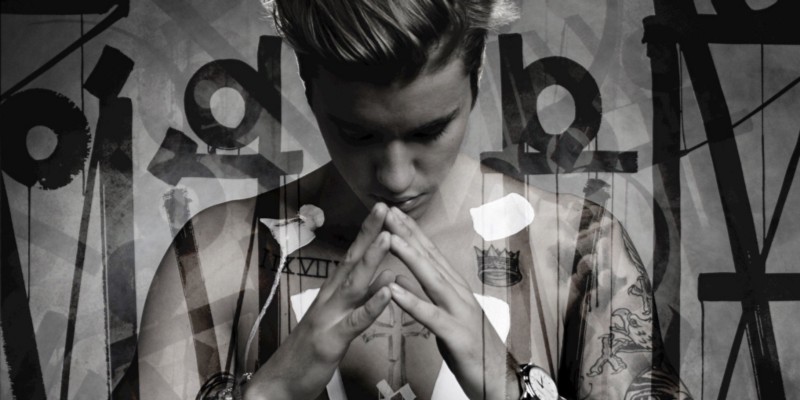
Back in September, I wrote about Justin Bieber’s renaissance. Since 2013, I’ve felt like there’s been a shift occurring in his career. It was something that most people were totally oblivious to because of his early music and inescapable persona, but I’ve always separated the kid from the music, so I latched on to him as a fan of his talent and potential. I’m not necessarily unique in this. Plenty of listeners like me have touted him as a capable musician, artist, and human. If you’ve followed his career, it’s not hard to see that there was a lot going on beneath the surface. He’s stayed afloat on the backs of his undying legion of fans, but there’s a reason he’s maintained a sizable portion of followers outside of the teenage girl demographic. That quiet portion of his fan base has steadily grown over the past few years, all the while predicting that a day would come where Bieber would attempt the tricky artistic leap between adolescence and adulthood, finally realizing his true potential as a musician.
For better or worse, successful or not, that day has come.
Purpose is here, giving us our first real, carefully crafted look at Adult Justin. No more swoopy hair. No more high-pitched singing voice. No more singles with Usher, Ludacris, or Nicki Minaj. No more poppy dance instrumentals. This is it. Fans like me have been waiting years for this.
The album opens with “Mark My Words,” which kicks things off softly, taking a more pensive tone. The muted, slow-burn instantly reminded me of the opener that a fellow Toronto native chose for an album in 2011. It must be a big temptation with highly-anticipated albums to open the show with fireworks, but songs like this almost always catch my attention more. Just like Drake, Bieber wasted no time after the opener to throw things into gear.
JB kicks back atop a bucking Skrillex instrumental for “I’ll Show You.” Although the beat hits a fairly chaotic stride for the hook, Bieber’s vocals never progress past a relaxed tone, making this one feel like an epic movie explosion in slow motion. Lyrically, he promises to prove doubters wrong in the face of his struggles with fame. He reminds listeners that he’s a human being after all, which is something that often seems lost on celebrities, especially those of Bieber’s ilk. The song plays a role in the scope of the album, and the production and melodies salvage it all, but I can’t help but feel like this whole thing is a bit trite. Yes Justin, we know “Sometimes it’s hard to do the right thing/ When the pressure’s coming down like lightning.”
The unassailable “What Do You Mean?” is next, quickly righting the ship and making me wonder again how J Biebs on tropical house music seems like the most obvious choice on this whole album, and possibly my favorite artistic decision of his career. He goes back to the well with “Sorry,” which is the ultimate collision of old and new Bieber. This is a 2015 version of “Baby,” riding on an Latin-influenced house beat, bolstered by Bieber’s finely tuned falsetto. His bread and butter has always been upbeat, danceable, carefree pop music, and this is the most well-executed version of that we’ve ever seen from him.
It’s ironic that after all the talk of Bieber finding his niche on house and EDM production that the album’s lasting moment comes on one of its most humble, stripped down tracks. Batten the hatches, because “Love Yourself” seems poised to annihilate Top 40 radio. This is criminally catchy, and employs the same kind of lyrical dissonance that made “What’s Up Fatlip?” and Foster The People’s “Pumped Up Kicks” interesting. Beneath the upbeat, cute pop ditty exterior is a tale of lost love that Bieber has apparently gotten over, channeling a beautiful irreverence that works so well in any breakup song. This one also contains one of the best underhanded burns you’ll hear in 2015: “My mama don’t like you, and she likes everyone.”
Sheesh, Justin.
Before easing to a stop, the song makes sure to slide into a gentle trumpet riff, channeling the chart-topper Bieber shared the Song of the Summer 2015 crown with.
The tag team of pop music titans seems to have created one of those “impossible to fail” scenarios. Captained by Justin Bieber. Co-written by Ed Sheeran. Produced by pop mega-producer Benny Blanco. Again, this will be all over your radio before you know it.
If you’re somehow bored at this point, we switch gears again for “Company,” which sees Bieber play around on an EDM beat with subtle trap influences like snare rolls. Despite not consisting of any actual lyrics, the back half of the chorus is one of my favorite parts of the album, riding a throbbing bass that makes it impossible not to move around a little bit. At least a toe tap or a head nod. I don’t know if nightclubs are open to playing Justin Bieber, but this seems like a perfect playlist addition.
It’s at this point that I feel like the album makes its first true misstep. There is nothing compelling about “No Pressure.” The whole vibe is cookie-cutter R&B, and the guest appearance from World’s Most Mediocre Rapper Big Sean doesn’t help things at all:
I know you don’t wanna talk, right
We’ve been on and off like the cross lights
You heard I’m playin’ with them h — s like I golf, right?
When I touch you, I get frostbite
Girl you’re so cold, so cold, so cold
How we so young but livin’ so old?
Those are actual lyrics from a world-renowned hip-hop artist. Ugh.
“No Sense” feels more like what Bieber and Sean should’ve aimed for. This one is produced by Travis Scott, and the trap influences here are much less subtle. The vocal performance is still too R&B for my tastes, but at least the beat has some teeth to it. Despite not being known for lyrical talent by any means, Scott still manages to outshine Sean here. Neither are very impressive. I’ve always been a fan of Bieber teaming up with hip-hop artists, but both of these were letdowns.
I’m sure most people have experienced a moment where they wonder if they really love a person, or just the idea of them. Is it love or lust? It’s safe to say that something like this would not have been fair territory for Bieber just an album or two ago, but he doesn’t hesitate to dive into the idea on “The Feeling.” The entire concept almost feels anti-Bieber, at least the version of him that preceded this album. It’s not the kind of happy-go-lucky thing that teenage fans slurp up.
If you’re into production surprises, your time has come. This is the most interesting backing Bieber has ever enjoyed, powered by skittering, rickety percussion and a pounding bass line. Adding to the appeal is the gloriously airy vocal assist from Halsey. I’ll be honest: I have no idea who this girl is. But she’s doing all kinds of awesome things here. Props.
The album continues with its maturity — albeit in a more introspective tone — on “Life Is Worth Living.” JB has never been known for his lyrical prowess, but this track actually leans on songwriting and it works. It’s hard to have a ballad without good writing, and Bieber & Co. pulled it out.
After a short detour into “Where Are U Now,” the album returns with its most baffling choice. I don’t have a single idea what “Children” is supposed to be. Based around some ridiculous The children are the future concept, the song inexplicably lurches into some chaotic fever dream of a beat by Skrillex. I guess it takes something like this to remind you why Bieber and Skrillex have never been known for their artistic sensibilities. Given all they did on this album together, I’m willing to just chalk this up as a loss and move on.
In his cover story with Complex, Bieber turned heads by speaking frankly about his faith:
“We could take out all of our insecurities, we could take away all of the hurt, all the pain, all the fear, all the trauma. That doesn’t need to be there. So all this healing that you’re trying to do, it’s unnecessary. We have the greatest healer of all and his name is Jesus Christ.”
The album comes to a close with its title track, which is a musical manifestation of this idea. I’m sure Justin’s life, especially the most recent chapter, has felt like a marathon. My own life is tiring enough, and I didn’t grow up in the spotlight, living under a microscope. It must be exhausting. The finale reveals the meaning behind the album’s title, as Justin thanks God for putting him on earth for a reason, and for giving his life purpose.
For newer fans, I’m sure Purpose seems unwieldy. When your only experience with an artist is tabloid stories and teenybopper music, something with this kind of ambition is going to catch you off guard. I saw it coming, and some of the nuances still surprised me.
It’s certainly not perfect, and there’s a lot lost in throwaway Big Sean verses and muddled concepts near the end of the album, but Purpose does its job. It’s a proof of concept. JB can make mature music. I’ve been waiting for this album since I first heard “One Time” in 2010. For Justin, this apparently feels like the end of a journey. To me, it sounds like the beginning. Justin Bieber has arrived.
Originally published at fromloveland.com on November 17, 2015.
